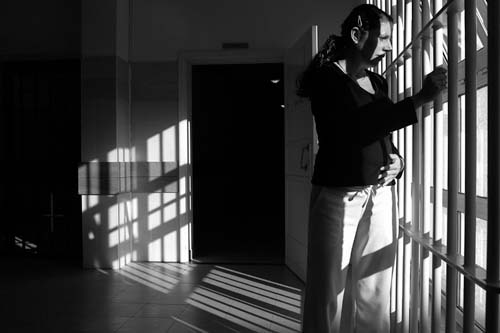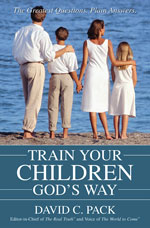 AFP/Getty Images
AFP/Getty Images
Article
Learn the why behind the headlines.
Subscribe to the Real Truth for FREE news and analysis.
Subscribe NowDriving into the large, nearly empty prison parking lot, a young boy is roused by his grandfather, after they had risen before dawn to make the four-and-a-half-hour drive.
Walking into the gray brick building, the two begin over an hour of processing, paper work and searches.
“Do you have anything in your hair?” a prison guard states firmly, his eyes sizing them up.
“Please pull out your pockets and turn around,” the guard orders.
The grandfather complies and finally the boy, too, after some coaxing. They are then directed through a metal detector.
The young boy tensely walks through the detector, not relaxing until he is through; a few visits ago he had set it off with his belt buckle.
Next, the grandfather and boy are guided through a series of large metal doors. They soon find themselves in a small room, with tables that have board games, and the whir of vending machines lining the wall.
They wait.
Finally, a guard leads an inmate in who is wearing an orange jumpsuit. The boy’s face explodes with joy. He leaps up and hugs the inmate around the waist.
“Mommy!” he cries.
Lasting Scars
The above scenario is a reality for many of the nearly two million U.S. children estimated to have a parent in prison.
Since mandatory sentencing began in the mid-1980s, the United States prison system has seen a dramatic upswing in incarceration rates. This includes an increase in the number of women, who now constitute the fastest growing segment of the prison population. Between 1995 and 2006, the Correctional Association of New York reported that “the number of women inmates in state and federal prisons nationwide increased by 64 percent.”
Many of these law-breaking females are not only offenders, they are mothers, and most often it is their children who pay the highest price for their incarceration. Unlike fathers, it is estimated that 70% of women prisoners are primary caregivers.
Although children of incarcerated mothers are still able to cope—and overcome—the challenges set before them, there is always some residual emotional damage. Most experts agree that crime, even when not perpetrated on or by children, can leave lasting scars on a child’s life.
Of course, this is not the ideal way to rear a child—and having a mother in prison is an extreme, but very real, example of the high hurdles faced by many families in this age.
What are the effects on the development of children whose mothers enter the prison system—both now and long-term? How does a mother’s role change after imprisonment—and how does this event upset the balance of the family system? How could one hope to successfully rear a child in such a situation?
Silent Casualties
Called “crime’s invisible victims,” children whose mothers are sent to prison can range anywhere in age, from several weeks to 18 years old. Even children as young as 14 months old may have vivid memories of visiting their mother in jail, or live out their childhood in the foster care system—without their birth mother at all.
Unlike those who grow up in a traditional nuclear family setting, these children may have no fond memories of baking cookies with their mothers or taking family vacations with her. Instead, “quality time” is spent talking to their mothers through bulletproof glass or watching as guards lead her into a metal cell.
The following are excerpts from two letters written by children of incarcerated women, taken from www.womenandprison.org, detailing the effects of the situation in their own words.
A 12-year-old boy described his feelings during his mother’s prison term: “The worst part of my mom being gone was that I didn’t have anybody to talk to who really knew me. I stayed with my grandmother. It was hard for her to understand what was happening with me.
“I did not get to visit my mom. Not having my mom in my life was very hard. I had no one to help me go through my problems. Me and my mom were very close before and now I had no one to talk to. I could talk to my grandma somewhat but not personally. My sister tried to help, but she missed our mother too.”
“It made me feel pretty bad. I was mad at my mom for a while because I was afraid she would come out and then go right back again.”
Another child, whose mother was in prison for six months, wrote, “I got to visit my mom every week when she was gone to jail. My dad took us. It was hard because I wanted to touch her but she was on the other side of a glass wall. The visits weren’t too long, we only had a certain amount of time before they told us it was time to leave. When the visit was over, I wanted to stay with her for a long time. I thought about it all day. I didn’t cry but I felt really bad. It stayed with me for a while after I went.
“I didn’t tell my friends where my mom was, I told them she moved away. I could talk to my grandmother and my dad about it, but it was hard for them too. I missed my mom a lot, I missed watching movies with her, bike riding with her and I missed telling jokes.”
Children of incarcerated mothers grow up with the stigma of knowing that their mother’s “home” is a place that society considers disgraceful. And instead of feeling proud to have a positive example to emulate, the child feels ashamed and rejected, angry and confused—alone in a world that has difficulty understanding their situation. Often, these children cannot understand why their mother would want to be away from them.
Similar to children of divorced parents, they often reason that it is somehow their fault she no longer wants to take care of them, even when told otherwise.
The effects on children of imprisoned mothers do not end even when their mothers are released. According to statistics, such children are six times more likely to end up in prison when one or both parents have been incarcerated. Thus, along with imprisoned mothers, children become figuratively “locked” behind the metal bars of the U.S. prison system, thrown into a cycle that is hard to stop—whose ripples extend far beyond just the crime committed.
Effects of Imprisonment
When a mother is arrested, an estimated 90% of children are sent to live with (1) their maternal grandparents, (2) paternal grandparents or (3) their father. The last 10% are taken care of by friends of the mother.
Amazingly, children are more likely to be sent to live with their grandfather before their own father! This means that hundreds of thousands—approximately 1.9 million children across the country—live without both their father and mother.
According to the Correctional Association of New York’s most recent statistics, “as of June 2006, 203,100 women were in state or federal prisons or local jails, just under 10% of the total U.S. prison and jail population”—more than two million. In New York alone, as of January 2008, “2,821 women were incarcerated in New York’s prisons—about 4.5% of the state’s total prison population of 62,577.”
In addition, these statistics reveal the following:
“More than 65 percent of women in state prisons and 55 percent of men in state prisons report being parents of children under 18.”
“About 64 percent of mothers in state prisons lived with their children before prison, compared to 44 percent of men.”
“About 40 percent of women in state prisons were employed fulltime prior to their arrest, compared with 60 percent of men.”
“Nearly 30 percent were receiving public assistance before arrest, compared to 8 percent of men. About 37 percent had incomes of less than $600 per month prior to arrest, compared to 28 percent of men.”
Sabine Ferran Gerhardt, Assistant Professor at the University of Akron for Early Childhood Development, who runs a program through the local jail system that enables incarcerated mothers to interact with their children once a week, said, “…all children are at risk if a parent has been incarcerated.”
“These are not the environments that children usually witness their moms being a part of,” she said. “Mom usually isn’t hanging out with such a diverse group of people. Mom isn’t usually asking somebody’s permission to do certain things. Mom isn’t usually sharing a room, or even bunk beds, literally, with somebody she hasn’t normally done that with.”
Instead of preparing bag lunches, picking their child up after soccer practice, and being there to teach and guide their little boy or girl, mothers are removed for months, years or even decades—missing out on their child’s developmental years altogether.
 AFP/Getty Images
AFP/Getty ImagesMs. Gerhardt said one of the hardest things for children to see is the disempowerment of their mothers, who are no longer viewed as an authority figure in their child’s life. When parents are disempowered, she said, children lose the sense of authority that their parent once maintained and the ability to trust in them to take care of them.
“It ruins a child’s sense of well-being and security that their parents are not in charge,” she said.
That consistency, Ms. Gerhardt said, is vital to a child’s mental development.
“Children need to know what to expect,” she said. “They need boundaries. They need to know what’s coming, because in general they just don’t know what’s coming. As adults, we don’t tend to explain to them how things are going to happen or when they are going to happen…And so they are pretty much living their lives constantly on edge.”
This often carries into adulthood.
In prisons, Ms. Gerhardt said, there is a disconnect when children see their mothers because it is “public parenting.” Mothers are less likely to be open with their children, and sometimes cannot hug or hold them at all. This builds a sense of rejection in a child, who does not understand why he or she is being rejected. Often, she said, children who feel their world spinning out of control search for something they can control: drugs, alcohol and their eating patterns (which can lead to anorexia or bulimia).
Additionally, children of incarcerated parents are more likely to lash out at authority figures—especially police—in the future, whom they hold responsible for taking away their mothers.
Not surprisingly, Ms. Gerhardt said, this has caused the family system to careen toward disaster. Instead of the parent taking care of the child, the child now feels obligated to take care of the parent. Instead of worrying if the weather will be nice enough to play outside, children of incarcerated parents worry about what their mothers will eat and where they will sleep.
“The entire communication pattern between mother and child is upset,” she said, stating later, “When that relationship starts to get strained, the entire family crumbles.”
But are mothers and fathers at fault? Who is to blame for their inability to parent and be good examples for their children?
Although Ms. Gerhardt maintains that, while all parents have the capability to make mistakes, part of the problem is that most often the parents have not been properly instructed on how to care for children in advance.
“Parents are never trained to be parents,” she said. “They just fall into that role, sometimes by choice, sometimes by accident…Unlike any other job where we give you training, where we give you an apprenticeship essentially, where we have a monitor there to help you through it…we’re flying solo through that process.”
Often lacking in parenting is the principle of cause and effect. In fact, many go through their entire lives not realizing this law applies to every situation they experience. The decisions of parents (the causes) can greatly affect and shape their children’s future.
Parents who commit a crime cause a shockwave of effects. They are put in prison and parted from their children. Their families are torn apart, often making grandparents fill the role of mother and father. Children must deal with the emotional effects from their parent’s decisions, often falling into crime and into the same cycle as their parents.
When these children grow and have families of their own, what will be taught?
But the effects do not stop there. They surge outward, affecting neighborhoods, cities, societies and entire nations. With each family—the building blocks of nations—torn apart, the fabric of society continues to shred.
And with each decision of parents, good or bad, the one most affected is their children.
The Family Pulled Apart
There is an oft-quoted proverb about parenting that states, “Train up a child in the way he should go: and when he is old, he will not depart from it” (Prov. 22:6). But how are parents to know what “way he should go,” even in optimum conditions, if they are not taught?
Often, new parents are left to “figure things out,” with society believing that parenting is something that can be done by instinct.
Also, from the examples above, even if the parents in prison did have a stable home life during their own childhood, one only has to look at the offenses they committed that landed them in prison to see that they were not raising their children in an environment conducive to a proper upbringing: aggravated assault with a weapon, possession of narcotics, felony theft, first degree murder. Even if these parents did turn around their lives, where should they turn for answers?
For many this may seem to be a sad situation that cannot, does not, apply to them. They may “feel” for those in such situations and then go about their day. And, while this is a narrow example of how situations such as this have the capability to destroy individual lives and entire families, it is not as uncommon as it once was.
More than ever, the family unit is beset on every side by problems of every sort. This push-the-envelope-at-all-costs age in which we live threatens to tear children’s lives and futures to pieces. How can parents arm themselves against such odds?
Society does not help! In a time with more books on the topic then ever before, families and their relationships fall apart—it is often looked upon as “merely part of life.”
While most cannot see how deep-seated their problems are—the state of children with parents in prisons is, tragically, only one of the many scenarios threatening every family.
Psychologists, religionists and experts of every sort cannot figure this out, or even to whom to ask the questions. They simply do not know where to begin. Book upon book is written, with every slant, every angle—and yet, problems continue to mount.
The answers come from the same place as the proverb mentioned before—the Bible—God’s instruction manual for mankind.
No one teaches how to properly rear children, and no one is offering firm answers. Are we to believe that God would say there is a way to rear children and leave us in the dark as to how?
NO! Not only does God’s Word tell parents to “train up your child in the way he should go,” it details how this is to be done. Contained in its pages is a road map for parents who are prepared to admit they do not naturally know how to perform their parenting duties.
Readers are urged to read the book Train Your Children God’s Way, posted at rcg.org. It does not offer the opinions or conjecture of the author; rather, it explains in detail why families are failing and reveals—through Scripture—how one should raise children to lead happy, productive lives—with purpose!
More on Related Topics:
- Haiti Faces a Sexual Violence and Abuse Crisis as Gang Violence Spreads, Health Charity Warns
- As Haiti Faces Further Political Turmoil, the UN Signals More Troops on the Way
- Hopeful Yet Wary, Venezuelans Across Latin America Mull Going Home
- Their Homes Survived the Historic LA Area Wildfires. A Year Later, They Fear Living in Them
- U.S. Travelers Scramble to Adjust as Airlines Cut Flights Because of Shutdown



